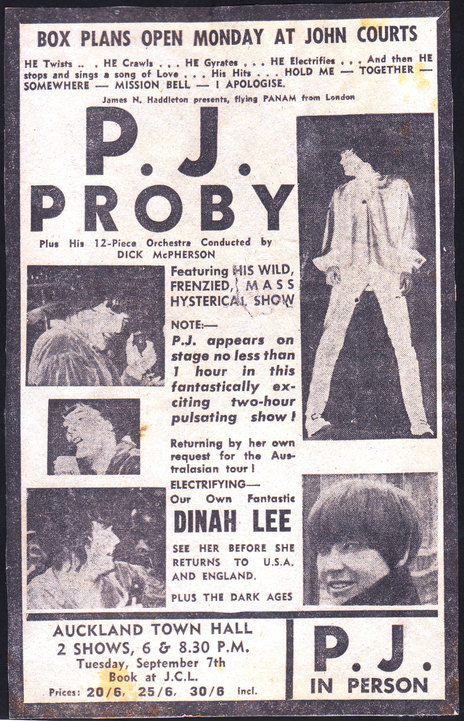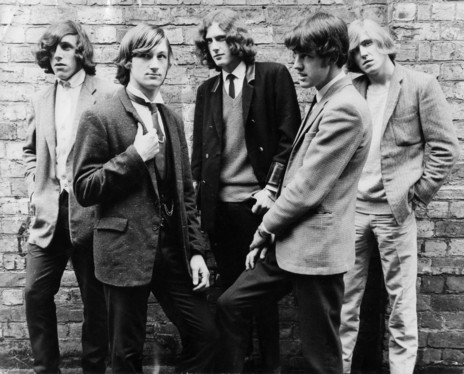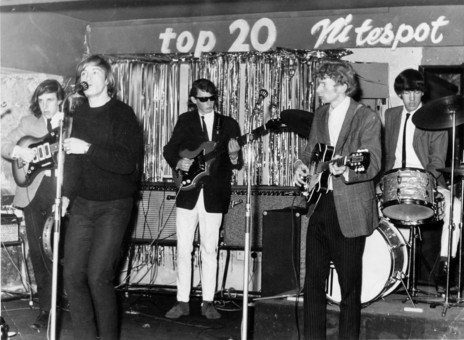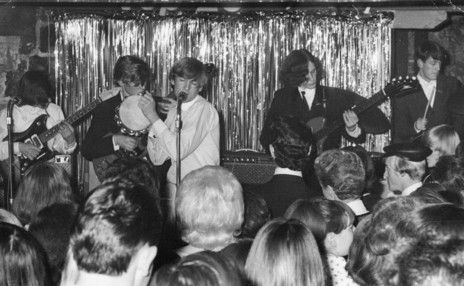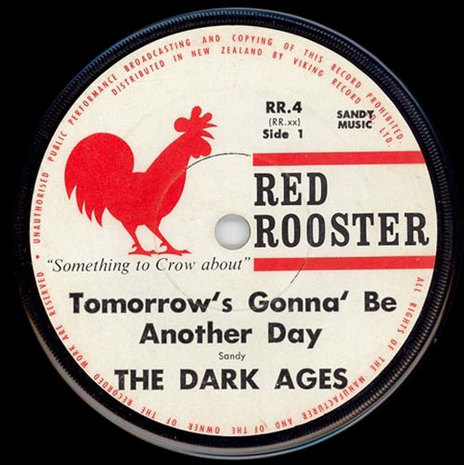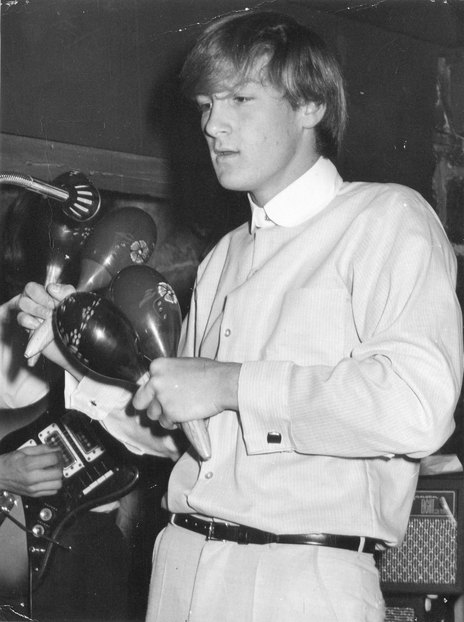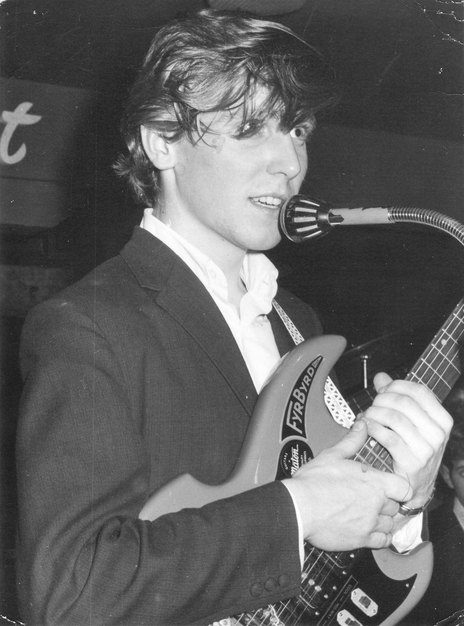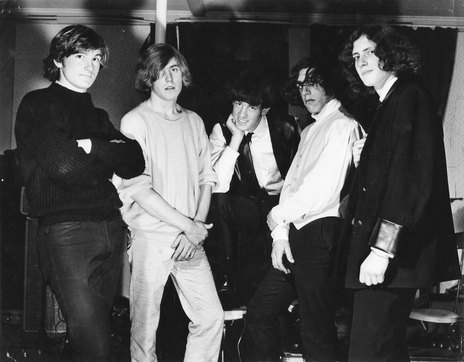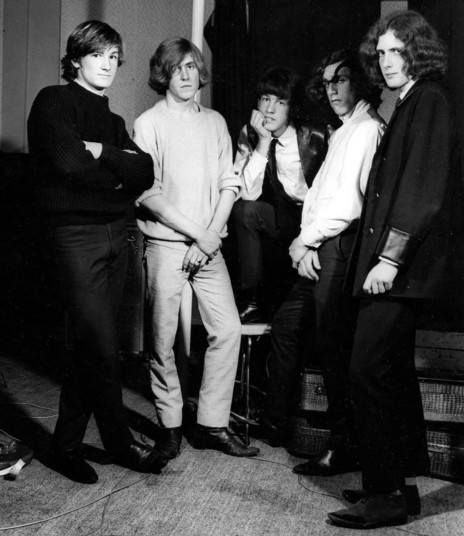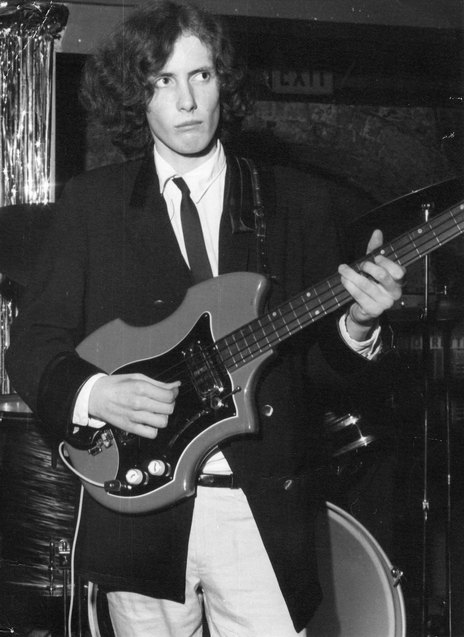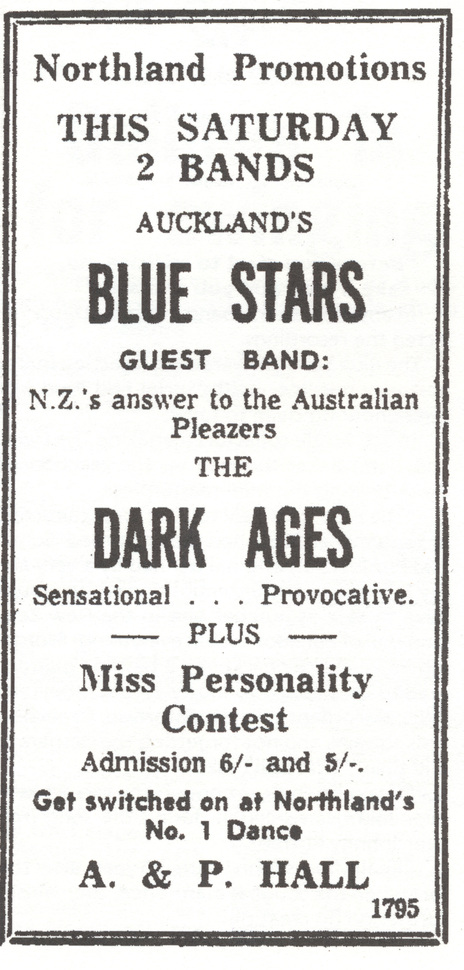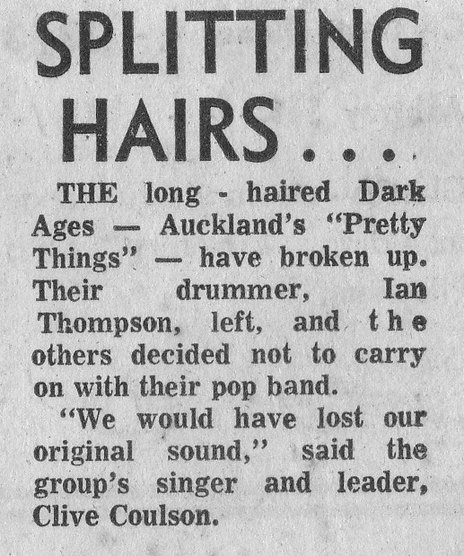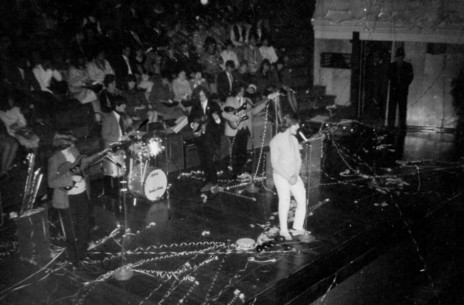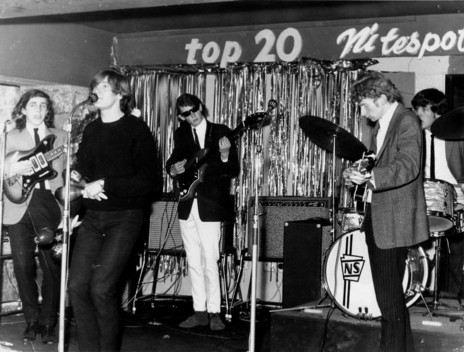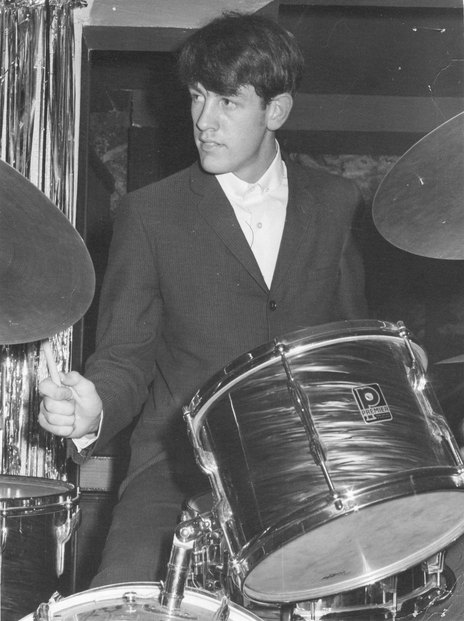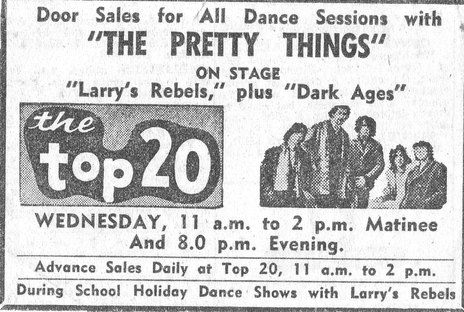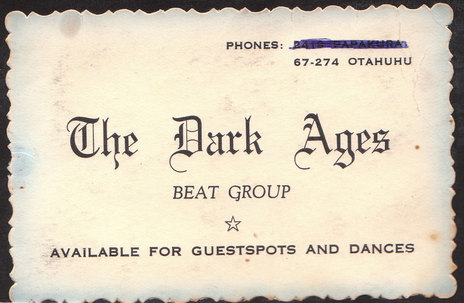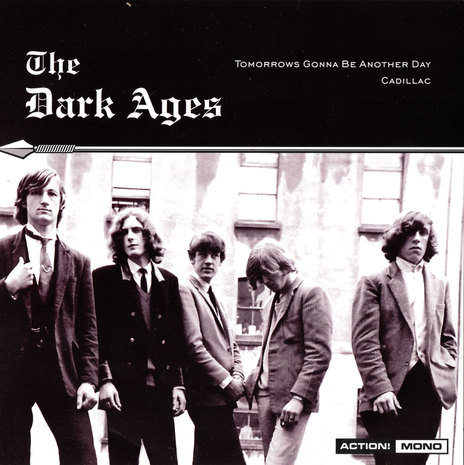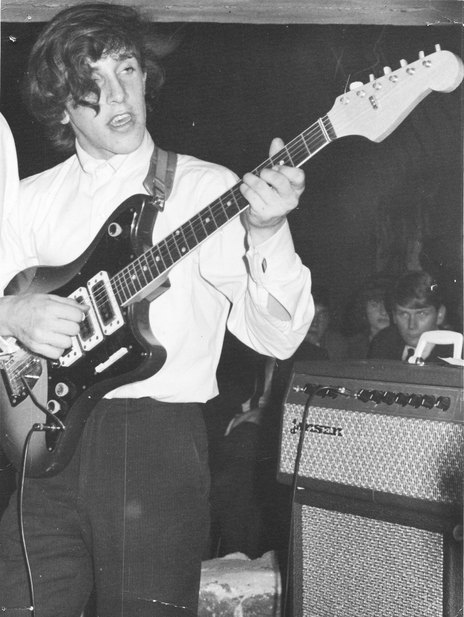The Dark Ages were a fiery combo who grew out of an earlier band featuring Sibley, Ed Meese, John Talbot, and Mike Donnelly, before consolidating around Sibley and (briefly) Donnelly with fellow Otahuhu High student Clive Coulson stepping in on vocals. The line-up was completed by Penrose High alumni Ian Thomson, Darryl Keogh and Vaughan Stephens (ex-Wildcats). Sibley’s fascination with medieval times gave them their mysterious moniker, The Dark Ages.
The quintet had the usual band dreams of the era – to play around their home turf, score a city residency, hitch up as a support band to a hot touring act and maybe even release a single.
The quintet had the usual band dreams of the era – to play around their home turf, score a city residency, hitch up as a support band to a hot touring act and maybe even release a single.
All of which they'd eventually achieve, although for Coulson, it would prove only the beginning. Within four years, he’d be walking the streets of London, crashing on The Human Instinct's floor, working for The Pretty Things, Jeff Beck and Led Zeppelin, staying with Jimmy Page and co from their second American tour until 1972. Long enough to be etched into the dark Zeppelin myth. Along the way, he met Captain Beefheart, Jimi Hendrix and Sly Stone, before going on to manage Bad Company with Led Zeppelin manager Peter Grant.
All the while unsubstantiated rumours were circulating back in New Zealand about Coulson. That he was a “playboy entrepreneur” who mysteriously made a fortune from his involvement with Bad Company. That he nursed a love for solo star Sandy Edmonds that brought him back to New Zealand in the early 1970s to propose (unsuccessfully) and that he was one of the infamous roadies in Stephen Davis' dark Led Zeppelin biography, Hammer of the Gods.
But that was pie in the sky to the bluesy long hairs who got together in early 1965, excited by a slew of charting R&B acts: The Kinks, The Pretty Things, The Downliners Sect and The Rolling Stones. It was a chunk of musical turf they'd have little competition on until the arrival of The Pleazers from Australia six months later.
So there they were, Sibley, a future zoo keeper, Thomson, an apprentice printer, Auckland Star trainee Darryl Keogh, trainee stock agent Coulson, and Vaughan Stephens, a ... well, Vaughan was a purist.
“They either had to accept him as he was or not at all,” recalls Coulson. “He had a brilliant brain at school, but he went down in classes because he was totally focused on being a musician,” adds Thomson.
The local vicar in Papakura refused to let them play his youth club because of their long hair, only to be reminded by Clive's mum that Jesus had long hair.
Stephens cut quite a figure in the conservative sixties. “He had really long fingers, baby soft skin, a funny little laugh, and wore a black jacket with leather collar,” says Thomson. Stephens was also the main source of the band’s live songs.
The Dark Ages built a good following in South Auckland in 1965, placing second to The Clevedonaires at the Clevedon A&P Show. The local vicar in Papakura refused to let them play his youth club because of their long hair, only to be reminded by Clive's mum that Jesus had long hair.
Sibley recounts similar tales about the effect their hair and dress had, although it appears that the “seedy” tag sometimes applied to The Dark Ages is an exaggeration. Sibley: “Although we had long hair, we were reasonably smart, we didn't swear or drink on stage, we never did that, or drugs (they came later).”
The Dark Ages could be seen around town at the Bel Air coffee lounge near the Auckland Town Hall before landing a spot at the Top Twenty in Durham Lane, where they alternated with The Premiers and Larry’s Rebels. Coulson was living in a council flat in Beresford Street in central Auckland (the scene of many wild parties to come) and working just off Queen Street at Dalgety’s.
Mid year, they scored a support slot on the PJ Proby tour, which was a nerve-racking experience for the group as Clive and Ian were both sick with tonsillitis. Soon after, The Sex Pistols of the sixties, The Pretty Things, hit town. On their return to the Queen City after a scandal-fed national tour they played three shows at the Top Twenty (plus lunchtime shows) supported by The Dark Ages, who had a large number of Pretty Things songs in their set. It was there that Coulson befriended the wild boys. It was a contact that set him up well when he shifted to England.
Before Keogh’s departure (he was replaced by Red McKelvie), The Dark Ages recorded their only single in late 1965 at Viking Studios. Coulson: “We were at the Top Twenty and Ron Dalton of Viking Records came in with a demo record of ‘Tomorrow's Gonna Be Another Day'.”
The Dark Ages recorded the song in one take with gear borrowed from The Defenders, and plucked ‘Cadillac’, a number off The Kinks’ first album, for the flipside. The single appeared in early 1966 on Viking’s “tester” label, Red Rooster Records, selling well in Auckland and charting locally before passing into history and becoming a record collector's wet dream.
By now they were touring the North Island, venturing north to Whangarei with The Bluestars to play the A&P Hall, billed as the “sensational provocative Dark Ages.”
Thomson: “At the time, Whangarei had a real problem with Hells Angels. We were being chased up the road by them, when all of a sudden this guy yelled out: “Hey Red (McKelvie)." It was this big black West Indian guy that Red knew as a seaman, who used to watch him at The Platterack when he was with The Chelsea Beats. He formed a barrier between us and the Angels with his mates.”
They had fewer problems in Auckland where they were often escorted by their unofficial minders – Willie White and the White Boys – some hardened friends.
The end was nigh, however. The band had stopped moving forward and they weren’t learning any new songs or getting many gigs by this stage.
Cue a dreary timber town in the middle of the North Island in mid-1966 where The Dark Ages had just played the Top Cat Club. After being refused service in a food joint because of their long hair, they hit the road home in Coulson's 1934 Chevrolet Junior, loaded with band gear. Closer to Auckland, they argued about petrol money and Thomson was chucked out of the car in Penrose. Stephens, already sick of Coulson, had few regrets at the imminent breakup, so they called it a day after playing a farewell show at The Galaxie.
Coulson went on to MC at The Shoreline and the Top Twenty before joining The Rayders for their final single, the cranking, Who-like, ‘Working Man’. He stayed with The Rayders long enough for a residency at Hamilton’s Three Musicians Club before briefly joining Hamilton’s The Mods for a Wellington tour with The Breakaways. He finally departed for England in early 1967. There he resumed his friendship with The Pretty Things and roadied for Dave Hartstone’s (ex Human Instinct) PA company.
In 1970 Clive Coulson shifted to Australia, lived with Sandy Edmonds for a while and fronted Mecca before returning to the UK less than a year later. He was back in New Zealand in late 1995 after selling the West Chiltington, West Sussex farm he'd turned into a golf course.
After The Dark Ages, Ian Thomson and Mick Sibley joined The Underdogs. Thomson went on to The Brew with Doug Jerebine and Bob Gillett. Mick Sibley worked at Auckland Zoo and trotted out around town blowing his harp and playing guitar as a solo act. Stephens and Keogh both died young and Clive Coulson and Mick Sibley have also since passed away.
–
The Dark Ages only single was reissued in 2000 on an unofficial EP, albeit one that used the original master tapes.
–
Ian Thomson's story.
